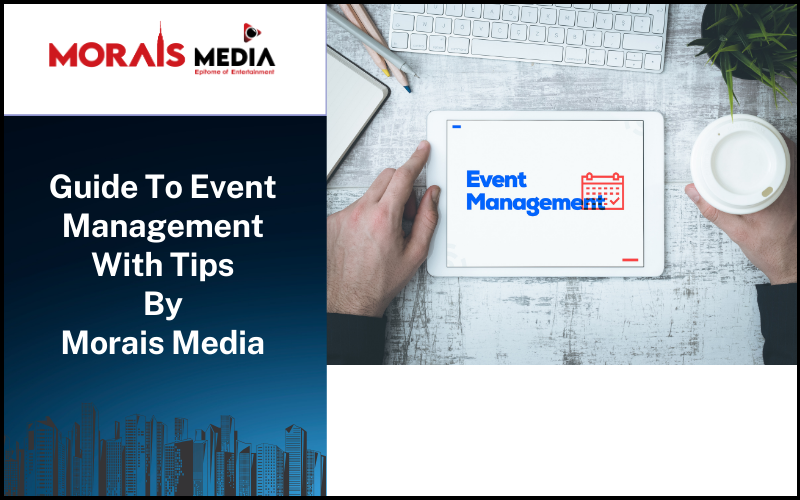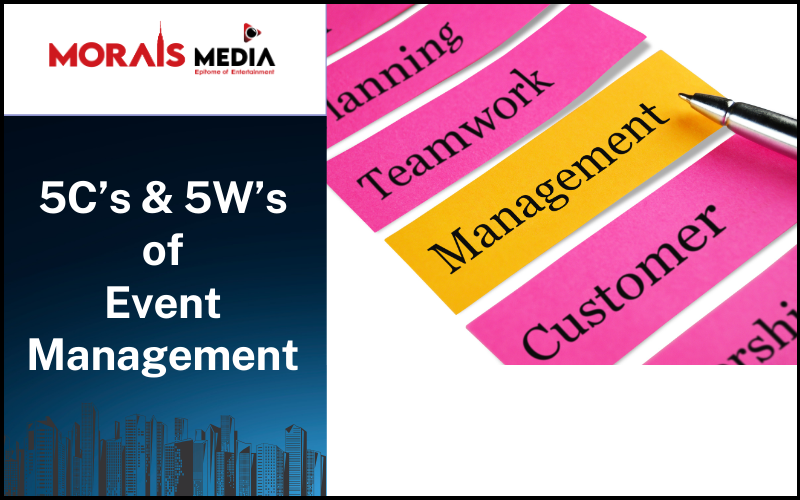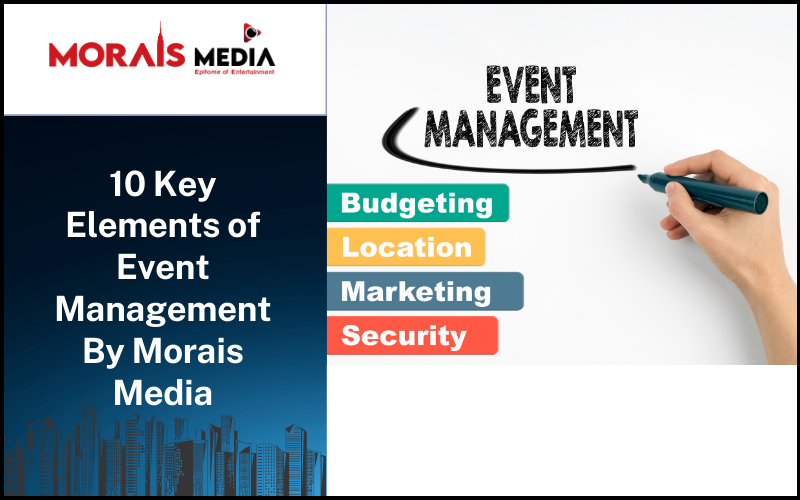
Planning and executing a memorable and effective event requires more than just a compelling idea. It calls for strategic planning, attention to detail, and flawless organization. The task of orchestrating an event is akin to an art form—one that blends creativity with practicality. The challenge for event planners today is not only to manage logistical demands but to create an atmosphere that resonates with attendees, delivering an experience that aligns seamlessly with the event’s objectives and leaves a lasting impact.
At Morais Media, one of the top event management companies in Trichy, we understand the complexities involved in event management. Every event is unique, with its own set of goals, attendees, and challenges, and requires a distinct approach to ensure success. Our method is grounded in seven essential elements, which serve as the foundational blocks for planning and executing events that are both engaging and effective. These elements help organizers focus on the big picture while keeping track of each crucial detail—from the event’s infrastructure to its design. By incorporating these principles of event management, event planners can navigate potential obstacles, inspire audiences, and create unforgettable experiences.
Whether you’re planning a corporate gathering, a social celebration, or a community event, these essential elements guide you through each stage of event management. They provide a structured approach that keeps the event aligned with its vision and objectives while allowing flexibility to adapt to new ideas and unexpected changes. In this guide, we’ll delve into these seven elements and share practical tips for implementing each one successfully. By mastering these foundational principles, Morais Media aims to support event management planners in creating events that stand out and meet the high expectations of today’s audiences.
By following these core elements and integrating proven event planning principles, event management planners can ensure they’re meeting clients’ goals, engaging their audiences, and creating experiences that will have a lasting impact. Here, we outline these seven essential elements that guide our approach at Morais Media, allowing us to manage events of all types with precision and creativity.
7 Essential Elements of Event Management by Morais Media, Trichy
1. Event Infrastructure
Event infrastructure is the backbone of any event. Without a strong infrastructure, an event cannot function effectively. Infrastructure includes essential components such as venue layout, audiovisual setup, signage, and staffing. These elements provide the structural foundation that supports the event’s success. It also encompasses logistical considerations like transportation, accommodations, and technical support, all of which ensure the event runs smoothly. In corporate event management, infrastructure plays a crucial role in maintaining a professional tone and aligning with the client’s goals. Whether you’re hosting a citywide celebration, a corporate seminar, or a product launch, the infrastructure must be designed to match the size and scale of the event.
2. Core Concept
A well-developed core concept is essential for giving purpose and meaning to any event. The concept shapes the direction, scope, and theme, setting the event apart from others in the same event categories. At Morais Media, we emphasize creating a core concept that is both unique and memorable, ensuring that every event resonates with its intended participants. A compelling concept can elevate an ordinary experience into an extraordinary one, making it the cornerstone of our event planning services. Whether it’s a corporate conference with an innovative product launch theme or a wedding built around a couple’s shared interests, the concept sets the tone for the event’s success.
3. Core People
Core people are the essential figures who connect with the audience and represent the client’s brand. In a corporate setting, for example, the right keynote speakers or panelists can leave a significant impact on the attendees, while in entertainment events like music performances, engaging performers can elevate the entire experience. Selecting the right core people is crucial, as they help to set the event’s tone, bring energy to the atmosphere, and leave a lasting impression. At Morais Media, we know that choosing the right individuals is central to creating an impactful event. Whether it’s a speaker at a business event or an artist at a concert venue, core people help to engage the audience and add personality to the event.
4. Core Talent
The talent showcased at an event—whether it’s a keynote speaker, a musical artist, or a subject-matter expert—is a fundamental part of the event’s appeal. The selected talent helps to captivate the core audience, creating a more personal and memorable experience. In entertainment events, the choice of talent can influence the event’s appeal and drive attendance. For example, the performers at a music concert will dictate the vibe and draw of the event. At Morais Media, we understand how important it is to choose talent that aligns with the event’s objectives. The right talent enhances the audience’s experience and plays a key role in ensuring that the event is remembered for years to come.

5. Core Structure
A well-defined structure is essential for the smooth flow and organization of any event. The structure can range from a highly detailed, formal layout to a more relaxed, informal setup, depending on the type of event. For corporate event management, the structure is typically rigid, with clear schedules, registration procedures, and coordinated roles for every participant. This ensures that every aspect of the event runs on time and according to plan. In contrast, events like social gatherings or festivals may have a more flexible structure, but they still require careful planning to ensure success. At Morais Media, we focus on creating a structure that supports the client’s goals and ensures that all aspects of the event—logistics, schedules, and roles—are clearly defined and adhered to. Core structure is a central focus in our event planning services, helping to ensure the event runs on schedule and meets all planning goals.
6. Target Audience
Understanding and engaging the target audience is crucial to an event’s success. Successful event management relies on aligning the event’s content and design with the needs and preferences of the attendees. Early identification of your audience allows you to make informed decisions about the budget, theme, and even the venue size. For a corporate event in Trichy, knowing the target audience helps to select the right speakers and topics that will resonate most. In entertainment events, choosing a venue and talent that match the audience’s interests is key to building excitement and engagement. At Morais Media, we believe that ensuring audience engagement is a top priority. By integrating feedback and preferences into the planning process, we create tailored experiences that keep attendees connected to the event’s purpose and overall goals.

7. Clients
Clients are integral to the success of an event, particularly when sponsoring events.They provide the financial backing and have specific objectives they wish to achieve through the event. Working closely with clients enables event planning planners to tailor the event to reflect their brand’s values and priorities. For Morais Media, building strong relationships with clients is at the heart of our event management services. This partnership allows us to create events that resonate with attendees while meeting the client’s objectives. Sponsoring events with clear goals enhances brand recognition and makes a lasting impression on attendees.
The 5 C’s of Event Management
The “5 C’s” are core principles of event management that guide planners through the entire planning process:
- Concept: The concept defines the event’s purpose and direction. It helps in making decisions about venue selection, themes, and the program.
- Coordination: Effective coordination involves organizing logistics, timelines, and staff to ensure every element of the event runs smoothly.
- Communication: Clear communication among clients, vendors, and team members ensures that everyone understands their roles and responsibilities.
- Control: Maintaining control over all aspects of the event—budget, schedules, logistics—helps mitigate risks and keeps everything on track.
- Culmination: This refers to the final delivery of the event. It’s the moment when attendees experience the impact of all the planning and execution.
The 5 W’s of Event Management

The 5 W’s are a helpful tool for event planners to address key questions that guide the event planning process:
- Who: Identifying the core audience and key stakeholders ensures the event is tailored to meet their needs.
- What: Defining the event’s purpose and objectives is critical for shaping its content and structure.
- When: Scheduling the event at the right time ensures maximum attendance and relevance.
- Where: Choosing a venue that complements the event’s concept is essential. Whether it’s a conference center or concert venues, the location must enhance the event’s theme.
- Why: Establishing the event’s overall purpose guides all planning decisions and helps measure the event’s success.
10 Tips for Effective Event Planning by Morais Media

- Start Early: Large events need 4-6 months of preparation, while smaller ones require at least a month. Finalize vendor contracts in advance.
- Stay Adaptable: Flexibility is key. Be ready to accommodate unexpected changes.
- Negotiate Prices: Set a budget and negotiate with vendors to ensure you stay within your financial limits.
- Delegate Tasks: Assign specific responsibilities to team members, such as catering or registration, to streamline event management.
- Create a Shared Document: Centralize all event details in one shared document for easy access by the team.
- Prepare Backup Plans: Always have alternatives ready in case of unexpected issues with key components.
- Conduct a Run-Through: Rehearsing the event helps identify potential problems before the big day.
- Capture Event Photos: High-quality photos capture the event’s energy and serve as marketing tools afterward.
- Boost Online Engagement: Use social media to increase event awareness and attendee engagement before, during, and after the event.
- Follow Up Quickly: Reach out to attendees after the event to build lasting relationships and measure success.
Conclusion
Creating a successful event requires a perfect balance of creativity, organization, and dedication to the principles of event management. By focusing on essential elements like infrastructure, structure, and talent, and applying the 5 C’s and W’s of event management, planners can ensure a smooth and impactful experience for attendees.
At Morais Media in Trichy, we’re committed to helping planners create events that exceed client expectations, effectively engage the core audience, and deliver lasting impressions. Whether it’s an intimate gathering or a large-scale concert event, our approach ensures that the event design is meticulously planned for success. Every event we manage is carefully executed, ensuring it is flawlessly event managed from start to finish. Through our dedication to quality and innovation, we continue to reinforce our reputation as a leading event management company.

